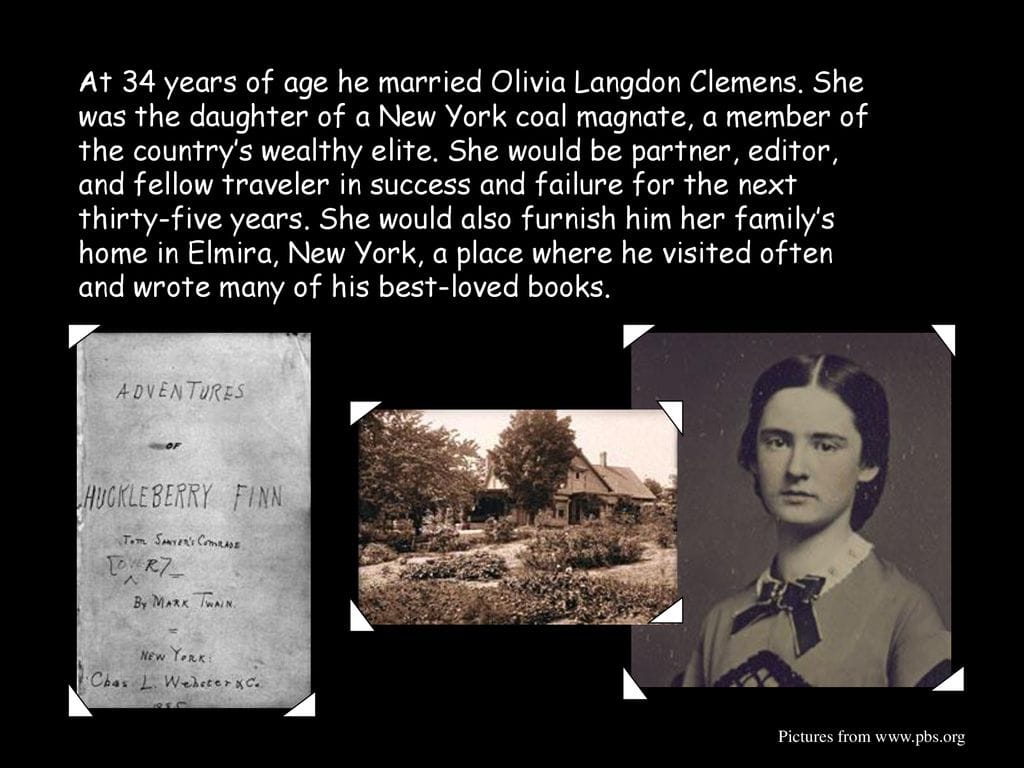Olivia Langdon Clemens, more than just the wife of renowned author Mark Twain, was a powerful figure in her own right. Her influence permeated not only Twain’s literary endeavors but also extended to the social landscape of their time. This article delves into the multifaceted life of Olivia Langdon Clemens, exploring her upbringing, her profound impact on Mark Twain’s work, her dedication to social reform, and the tragic circumstances surrounding her health and eventual passing.
The Making of an Influential Woman
Born Olivia Louise Langdon on November 27, 1845, in Elmira, New York, Olivia, affectionately nicknamed “Livy,” entered a world of privilege. Her parents, Jervis and Olivia Lewis Langdon, held a prominent position in society, their wealth stemming from Jervis Langdon’s successful ventures in the coal industry and other investments. This affluent upbringing afforded Olivia access to a world of literature and education, fostering her sharp intellect and strong moral compass. Growing up alongside her younger brother, Charles, and adopted older sister, Susan, Olivia’s formative years within this progressive family laid the foundation for her future social activism. It is likely this environment nurtured her independent spirit, a characteristic that would later define her relationship with Samuel Clemens, the man the world would come to know as Mark Twain. This background stands in stark contrast to the childhood of Roger Caruth, whose experiences, marked by themes of faith and doubt, offer a different perspective on navigating life’s complexities. For a deeper understanding of the interplay between privilege and social consciousness, the work of Sarah Meyerson, who examines the challenges and opportunities of workplace diversity, offers valuable insights.
A Literary Partnership: Shaping Twain’s Genius
Olivia’s influence on Mark Twain’s writing was arguably as significant as his own innate talent. Their meeting in December 1867, facilitated by her brother Charles, sparked a courtship largely conducted through letters. These letters, now held by institutions like the Shapell Manuscript Foundation, reveal a burgeoning intellectual and emotional connection. Twain’s relentless pursuit and Livy’s initial reservations add a captivating dimension to their love story. Married on February 2, 1870, they embarked on a journey that would forever intertwine their lives and legacies.
Olivia’s editorial contributions were substantial. She meticulously reviewed Twain’s manuscripts, providing insightful critiques and suggesting revisions. The Mark Twain House & Museum highlights her significant impact on both the style and content of his work. Her keen eye for detail and her unwavering moral compass likely tempered some of Twain’s more provocative tendencies, contributing to the enduring appeal of his writing. It was probably her influence that encouraged him to delve into themes of social justice and equality, shaping his work into powerful statements that resonated with a broad audience. Some scholars even suggest that Olivia’s impact on Twain’s work was more profound than currently acknowledged, with ongoing research delving further into the intricacies of their literary partnership.
Beyond the Pen: A Life of Purpose
Olivia’s life extended beyond the confines of her role as Twain’s wife and editor. She embraced the traditional roles of wife and mother, raising their four children: Langdon, Susy, Clara, and Jean. Managing the household, finances, and simultaneously nurturing her children’s development, Olivia demonstrated exceptional organizational skills and unwavering dedication to her family. However, her aspirations reached far beyond the domestic sphere. She was a fervent advocate for women’s suffrage and a champion of educational reform, co-founding the Hartford Art School. Her philanthropic endeavors and active involvement in social reform movements reveal a woman deeply committed to social justice. While the extent of her involvement in specific organizations remains an area of ongoing research, her progressive views, likely rooted in her upbringing, clearly shaped her life’s purpose.
A Legacy of Love and Loss
Tragically, Olivia’s life was punctuated by profound loss and persistent health challenges. The death of her infant son, Langdon, at just 19 months old, cast a long shadow over the family. The later loss of their daughter Susy at 24, and then Jean at 29, compounded their grief. While the specifics of their illnesses remain somewhat obscured by the limited medical understanding of the time, these tragedies undoubtedly took a toll on Olivia’s own health. She suffered from what some historians believe may have been a heart condition, exacerbated by the emotional strain of losing her children. The family’s move to Florence, Italy, in search of a more favorable climate suggests the severity of her illness. Despite these hardships, Olivia remained a source of strength and support for her husband and surviving daughter, Clara, who remarkably lived to the age of 88. Olivia’s passing in 1904, at the age of 58, left a void in Twain’s life, profoundly impacting his subsequent work, which took on a more melancholic tone.
Olivia Langdon Clemens: More Than a Footnote
Olivia Langdon Clemens was far more than “Mark Twain’s wife.” She was an intellectual, an activist, a devoted mother, and a powerful force behind one of America’s greatest literary figures. Her wealth, inherited from her father’s prosperous ventures, provided a foundation for their family’s comfortable life, including their elaborate home in Hartford. However, her contributions extended far beyond financial security. She brought social connections and cultural refinement to their marriage, opening doors for Twain in elite circles. Her legacy lies not only in her influence on her husband’s work but also in her own contributions to art, education, and social reform. While her story is often overshadowed by that of her famous husband, Olivia Langdon Clemens deserves recognition as a remarkable woman who defied societal expectations and left an indelible mark on her time. Her life continues to inspire further research, with scholars exploring the intricacies of her personality, the full extent of her social activism, and the complex interplay between her privileged background and progressive ideals.
- Revolution Space: Disruptive Ion Propulsion Transforming Satellites - April 24, 2025
- Race Through Space: Fun Family Game for Kids - April 24, 2025
- Unlocking the Universe: reading about stars 6th grade Guide - April 24, 2025
















